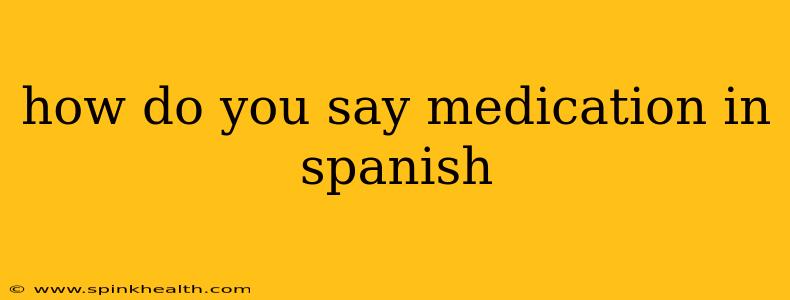How Do You Say Medication in Spanish? A Journey Through Nuances
The simple answer is that there isn't one single perfect translation for "medication" in Spanish. The best word to use depends heavily on the context. Think of it like choosing between "medicine," "drugs," "pills," or "treatment" in English – the ideal word shifts depending on what you're talking about.
Let's embark on a short journey to explore the various ways you can say "medication" in Spanish, along with scenarios where each word shines:
1. Medicamento: This is the most common and versatile translation. It's a broad term encompassing many types of medication, from pills to injections to topical creams. You can confidently use "medicamento" in most situations.
Example: "El médico me recetó un nuevo medicamento para la alergia." (The doctor prescribed me a new medication for my allergy.)
2. Medicina: This translates to "medicine," and often implies a more holistic or general sense of healing. While it can be used interchangeably with "medicamento" in certain contexts, it feels less precise when referring to a specific prescription.
Example: "La medicina tradicional china utiliza hierbas para tratar diversas enfermedades." (Traditional Chinese medicine uses herbs to treat various illnesses.)
3. Remedio: This word means "remedy" and often refers to home remedies or over-the-counter medications. It suggests a less serious or less potent treatment.
Example: "Mi abuela siempre tiene un remedio casero para el dolor de cabeza." (My grandmother always has a home remedy for headaches.)
4. Fármaco: This translates to "pharmaceutical drug" or "drug" and is more formal and often used in medical or scientific contexts. Avoid using this term casually.
Example: "Este fármaco se está investigando para tratar el cáncer." (This drug is being researched to treat cancer.)
5. Tratamiento: This translates to "treatment" and refers to the entire course of medical care, not just the medication itself.
Example: "El tratamiento para la diabetes incluye medicamentos, dieta y ejercicio." (The treatment for diabetes includes medication, diet, and exercise.)
Frequently Asked Questions (Addressing potential "People Also Ask" queries):
How do you say "prescription medication" in Spanish?
The most accurate translation would be "medicamento con receta médica" or "medicamento recetado." You could also use "medicación recetada."
What's the difference between medicamento and medicina?
While often used interchangeably, medicamento refers to a specific drug or medicine, while medicina has a broader meaning, encompassing the practice of healing and the general concept of medicine. Think of the difference between a specific pill and the field of medicine itself.
How do you say "over-the-counter medication" in Spanish?
This would be "medicamento de venta libre" or "medicamento sin receta."
Choosing the right word depends entirely on the context. Understanding these subtle nuances will help you communicate effectively in Spanish when discussing medication. Remember to always consult a medical professional for advice on your health and treatment.

